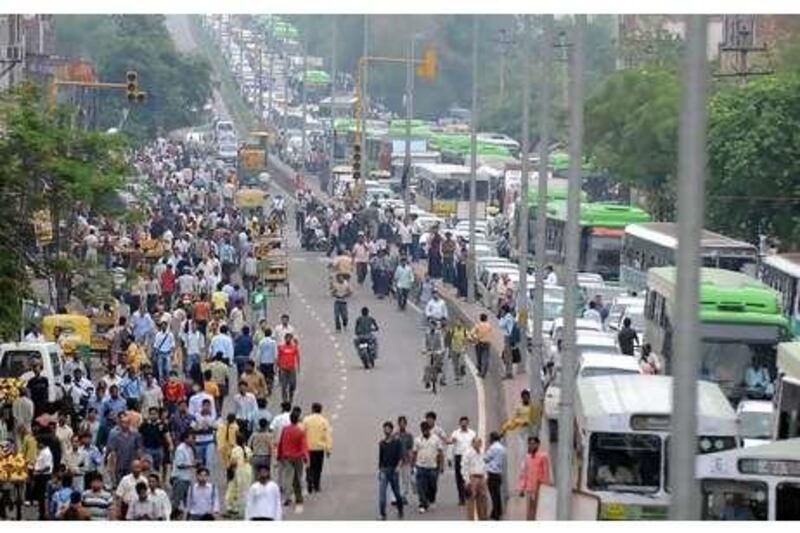MUMBAI // A countrywide dawn-to-dusk strike organised by India's opposition parties to protest against the recent fuel price increase and soaring inflation paralysed the country yesterday. Normal commercial activities were thrown out of gear as protesters forced vehicles off roads, businesses were compelled to shut down and trains and flights were cancelled in major cities.
"Commercial and economic activities in major parts of the country have come to a halt," said India's Associated Chambers of Commerce and Industry. "Attendance in most commercial organisations is very thin." The financial loss was about 30 billion rupees (Dh2.35bn), according to an early estimate by the Confederation of Indian Industry. The strike, led by the Hindu nationalist Bharatiya Janata Party (BJP), was called after the government led by Manmohan Singh freed up state-subsidised petrol prices late last month and raised the prices of other fuels to cut its US$5.5 billion (Dh20.2bn) fuel subsidy and its ballooning budget deficit, which touched a 16-year high of 6.9 per cent of GDP in the fiscal year ending on March 31.
The price of petrol was increased by 3.5 rupees a litre, while diesel rose 2 rupees and kerosene 3 rupees. Liquefied petroleum gas rose by 35 rupees per cylinder. Analysts say the rises could sharply increase the benchmark wholesale-price inflation, which rose to 10.6 per cent in May, exceeding the central bank's own estimate of 8.5 per cent. Consumer prices paid by industrial and farm workers rose almost 14 per cent in May.
Given that 65 per cent of goods in India are transported by road, the price hikes will stoke monthly wholesale price inflation by 0.9 of a percentage point, said Kaushik Basu, the chief economic adviser to India's finance ministry. Pranab Mukherjee, India's finance minister, warned last week "there will be no roll-back of fuel prices". To temper inflationary pressures, the Reserve Bank of India (RBI) on Friday boosted the repurchase rate, the rate at which it lends to banks, and the reverse repurchase rate, the main borrowing rate, by a quarter of a point each, to 5.5 per cent and 4 per cent, respectively.
But the Paris-based Organisation for Economic Co-operation and Development argues that the RBI's policy interest rate increases are "very low by historical standards". "With inflation remaining elevated and the recovery appearing to have taken root, there is a risk that price increases for inputs will flow through to second-round increases and that inflationary expectations will become destabilised," it said. "To mitigate this risk, sizeable further monetary tightening will be required through 2010 and into 2011."
Duvvuri Subbarao, the RBI governor, said the central bank would "take further action as warranted". According to a forecast by the Royal Bank of Scotland Group and Barclays, the RBI may follow with another quarter point increase at the bank's next policy review meeting on July 27. As a result of yesterday's strike, a majority of the 1,500 IT companies in Bangalore, India's technology capital, remained shut. Most companies asked their employees to work from home.
The All India Motor Transport Congress, which represents more than 600,000 truckers, declared its trucks would stay off the road to express solidarity with India's poor. It estimates that a day's strike costs truckers 10bn rupees and businesses across the country about 100bn rupees. But the worst-hit were daily wage earners, who make up the majority of 800 million of the country's 1.2 billion people living on less than $2 a day. A day's strike means a day without pay at a time of rising fuel prices and food inflation - the very reasons for the strike to be called.
"How is shutting India down going to make my lentils and sugar cheaper?" asked Raju Yadav, a construction labourer in Mumbai. business@thenational.ae





